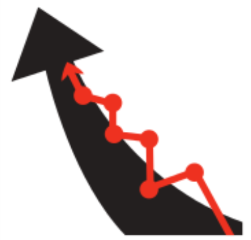Scalping the Forex Market: A Beginner’s Guide
An integral part of becoming a consistently profitable trader is finding a trading style that suits your emotional disposition. Fortunately, a number of trading styles are available.

Although each style differs on holding periods and frequency, position trading, swing trading, day trading and scalping are among the most widely used channels within the technical community.
Position trading involves holding trades long term, ranging from weeks, months and even years for some. Traders in this category tend to glean information from both fundamental and technical analysis, and typically focus their energy on slower timeframes: monthly and weekly scales.
Swing trading is, as its name implies, a medium-term trading style designed to hook market swings that vary from a couple of days to a few weeks. Traders in this class generate the majority of their trading signals via technical analysis, though fundamental analysis can also help form ideas as well. Popular timeframes within this field are the H4 and daily charts.
Many believe day trading and scalping are similar trading styles. While both take place within one trading day, day traders open one, maybe two, setups a day using timeframes ranging from the H1 to the M5 timeframes. Scalpers, on the other hand, aim to achieve profits from relatively small price changes. Scalpers often open and close larger numbers of trades using the M1, M3 and M5 timeframes, with the goal of catching multiple small wins.
Unlike position, swing and day trading, winning is critical when scalping.
Is scalping for you?
Personality is a broad term describing how people habitually relate to the world. After the developmental period through childhood and adolescence, these patterns of relating remain reasonably stable through life. They are traits that influence behaviour, thinking, motivation and emotion. In other words, it is fair to say we each have different goals; different aspirations; different trading account sizes; different temperaments and so on…
With that in mind, is your emotional make-up suited for scalping or are you likely to succeed using a different trading style?
Self-control and patience are two key elements to successful scalping. Although you could also argue these personality traits apply to all trading styles, we are specifically targeting the needs of a scalper here.
Traders need control of their emotions. Scalping the market involves long periods at the screens, which can lead to a loss of control, particularly after a couple of losses. Following your trading plan religiously should keep you out of trouble when the heat is on.
Though you are opening multiple trades each day, scalpers still need to exercise patience. Waiting for your setup to form is essential before pulling the trigger. Jumping the gun and hesitating have no place in a scalper’s approach, which can lead to traders wiping out days of gains in one fell swoop.
Another vital point, as highlighted above, is winning is critical in scalping. Unlike other styles which can house a win/loss ratio of less than 50% and still be profitable after a series of trades, scalping requires consistent winning due to the smaller gains achieved on the winning trades. In other words, a day trader might be right only 40% of the time, though on those times he/she is correct, the win outweighs the loss by at least 2:1. This is risk/reward and is an incredibly important facet in trading.
However, when scalping, the risk/reward ratio is typically tipped upside down, meaning traders generally net less than what they risk. An example of this is a position risk of $200 on a trade only netting a $100 gain. With a high winning percentage, though, these wins far outweigh losses. If you are uncomfortable with this high winning requirement, scalping may not be the trading style for you.
As with all methods, strict money-management rules are essential. Without this, irrespective of the trading methodology or trading style employed, you are doomed to fail.
Some pros and cons of scalping:
Pros:
- Carries less risk exposure. Time in the market is limited, therefore reducing the possibility of running into major market events.
- Compared to swing trading, where traders attempt to capture larger market moves, scalpers search for smaller moves that are easier to achieve.
- Even during relatively quiet markets, a scalper can exploit many small movements.
- Scalpers can quickly compound a trading account.
- Traders in this category can focus solely on technical analysis, though should remain aware of macroeconomic events scheduled for release.
 Cons:
Cons:
- Not suitable for those with full-time obligations.
- Forced to trade liquid currency pairs offering tight spreads. The EUR/USD, GBP/USD and AUD/USD boast high trade volume and low spreads, therefore serving as ideal candidates for scalpers.
- Scalping requires immense concentration. This is sometimes difficult for traders to sustain over long periods.
- Trade precision – limited room for error.
- The small gains, although profitable, can sometimes be debilitating for traders who miss bigger moves in the market.
- Commissions can add up. This is why it is important to select currency pairs offering tight spreads.
Final words
What this piece has (hopefully) accomplished is offer a primer into the world of scalping. The piece purposely avoided digging through the different scalping strategies available as to cover the subject in detail would be beyond the scope of this article. This, however, is something the team plan to cover in future articles.
A beginner’s guide to scalping in the forex markets investopediainvestopedia
![]()
![]()
![]()
![]()
![]()
![]()
![]()
Payment methods
Risk Warning: Derivative products are leveraged products and can result in losses that exceed initial deposits. Please ensure you fully understand the risks and take care to manage your exposure and seek independent advice if necessary.
ThinkMarkets Group is a global financial services provider, ThinkMarkets is a registered trademark of the group, that operates among various entities. For more information please visit the About Us section.
TF Global Markets Int Limited is authorised and regulated by the Financial Services Authority, Firm Reference Number SD060. Registered address: CT House, Office 9B, Providence, Mahe, Seychelles. Company number 8424818-1. Clients will engage with services offered by TF Global Markets Int Limited, unless otherwise stated, please see the legal documents, including the Terms & Conditions for specific details.
TF Global Markets (STL) Limited is registered in Saint Lucia, registration number: 2023-00272. Registered address: Ground Floor, the Sotheby Building, Rodney Village, Rodney Bay, Gros-Islet, Saint Lucia.
Please see the legal documents, including the Terms & Conditions for specific details.
TFG (Payments) Limited is registered in the United Kingdom, Company number 10537331. Registered address: G07, 35 New Broad St, London EC2M 1NH.
Think Capital Services UK Ltd is registered in the United Kingdom, Company number 11054653. Registered address: G07, 35 New Broad St, London EC2M 1NH
The information on this site is not directed to residents of the United States, Canada, Bermuda the European Union, Australia, United Kingdom, Russia and Japan and is not intended for distribution to, or use by, any person in any country or jurisdiction where such distribution or use would be contrary to local law or regulation.
© 2025 This website and technology/platform services are owned and operated by TF Global Markets (Aust) Pty Limited, with Registered address: Level 14 ,333 Collins Street, Melbourne VIC Australia 3000.
ABN: 69158361561 (part of the ThinkMarkets Group).
https://www.icmarkets.com/blog/scalping-the-forex-market/https://www.thinkmarkets.com/en/trading-academy/forex/what-is-forex-scalping-optimal-trading-conditions-and-strategies/






